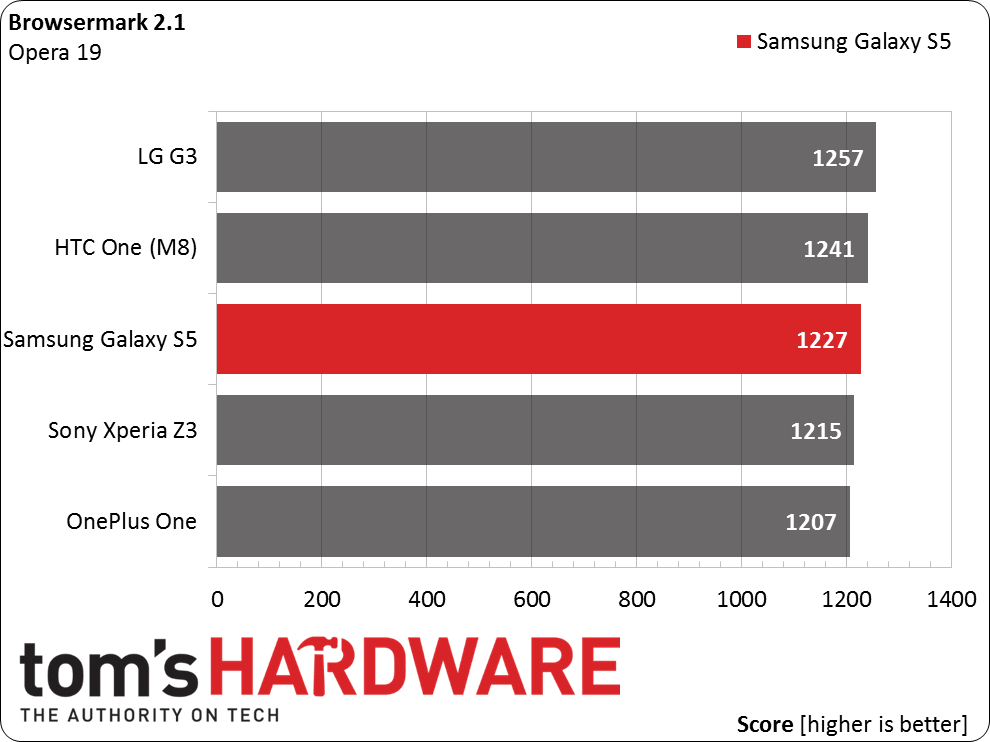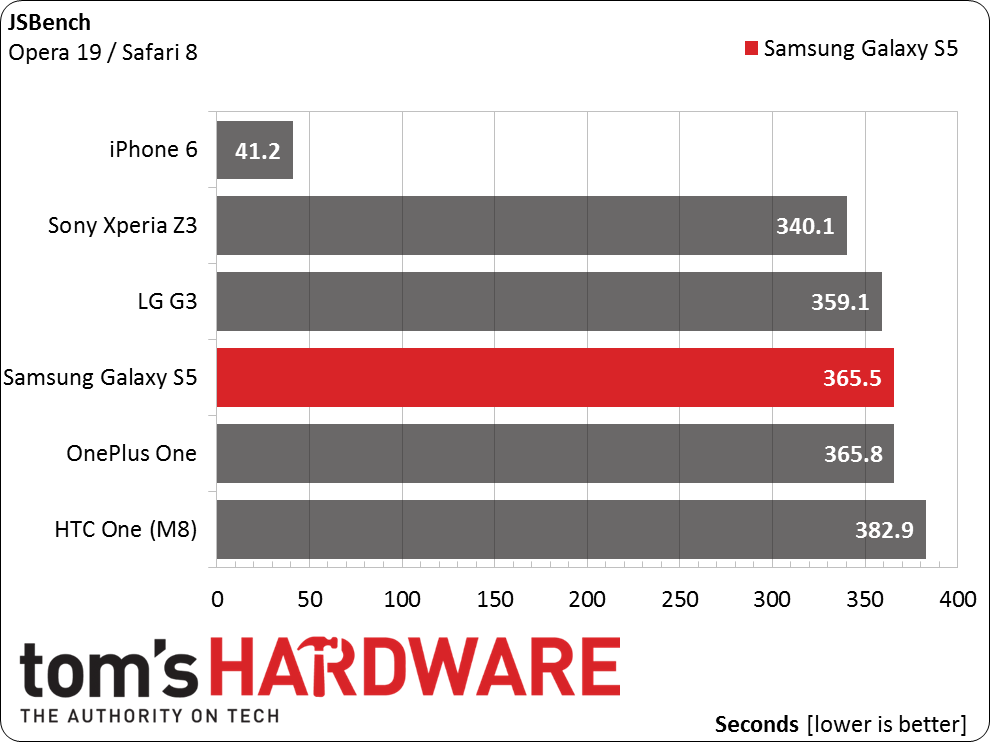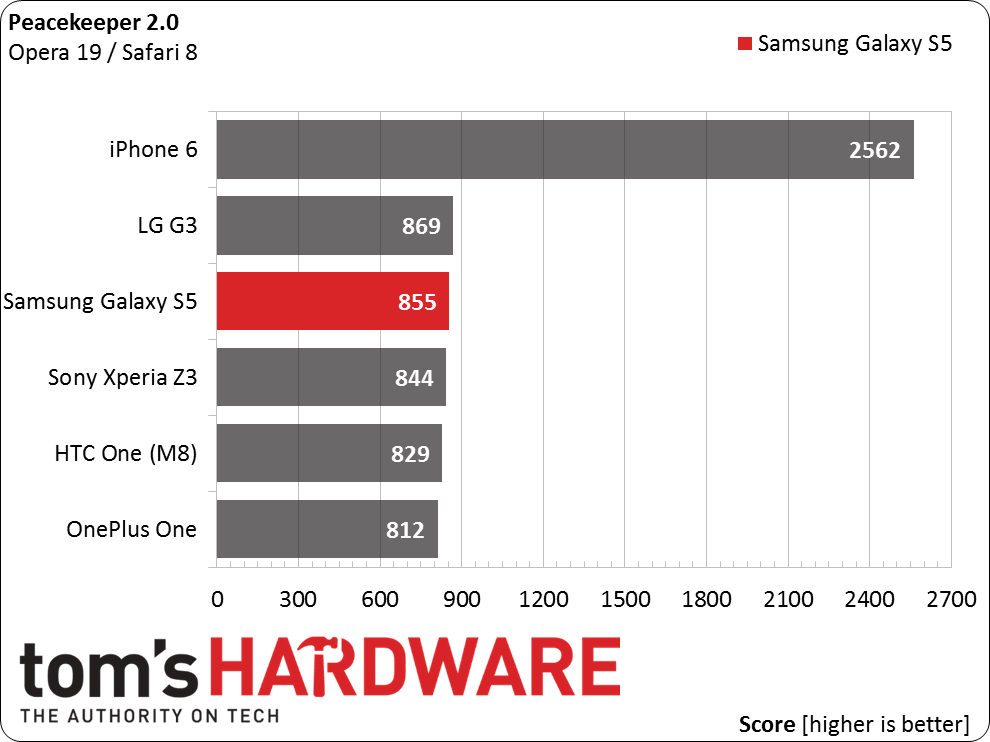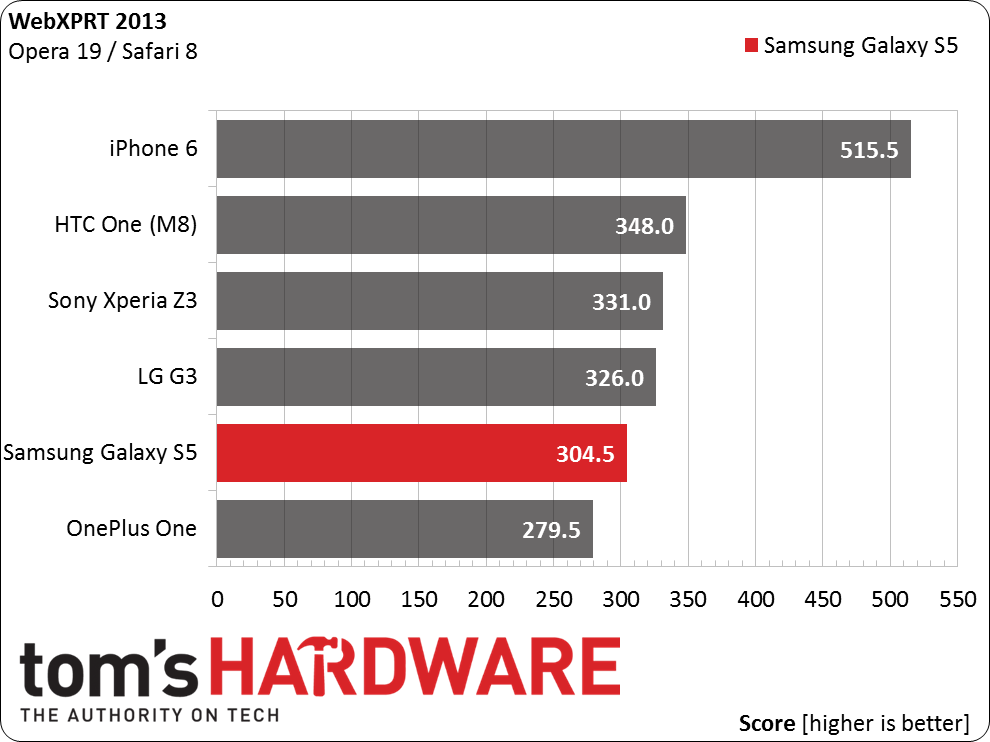Samsung Galaxy S5 Smartphone Review
Will the gravity well from Galaxy S5 capture your interest, or will you streak past with escape velocity?
Why you can trust Tom's Hardware
Results: HTML5 And JavaScript Benchmarks
The tests on this page are JavaScript- and HTML5-heavy selections from our Web Browser Grand Prix series. Such tests are extremely meaningful to mobile devices because so much of the in-app content is served via the platform's native Web browser. These tests not only offer a view of each device's Web browsing performance, but since these tasks are traditionally so CPU-dependent, browser benchmarks (especially JavaScript-heavy tests) are a great way to measure SoC performance among devices using the same platform and browser.
Browsermark 2.1
Rightware's Browsermark 2.1 is a synthetic browsing benchmark that tests several performance metrics, including load time, CSS, DOM, HTML5 Canvas, JavaScript and WebGL.
Performance is essentially identical for all the phones in Browsermark, which is to be expected.
JSBench
Unlike most JavaScript performance benchmarks, JSBench could almost be considered real-world, since it utilizes actual snippets of JavaScript from Amazon, Google, Facebook, Twitter and Yahoo.
The Sony Z3 shows a small 7% advantage over the Galaxy S5, but that's nothing to get excited about. The HTC One (M8) takes 5% longer to complete the benchmark due to its lower CPU clock.
The iPhone 6 Plus dominates this benchmark thanks to Safari’s JIT compiler optimizations.
Peacekeeper 2.0
Peacekeeper is a synthetic JavaScript performance benchmark from Futuremark.
Get Tom's Hardware's best news and in-depth reviews, straight to your inbox.
Since Peacekeeper is predominantly a single-threaded CPU test, it's not surprising that the results are similar to those from Geekbench 3 Single-Core. So far, the S5 matches the performance of its peers, avoiding any performance anomalies.
WebXPRT 2013
Principled Technologies' WebXPRT 2013 is an HTML5-based benchmark that simulates common productivity tasks that are traditionally handled by locally installed applications, including photo editing, financial charting and offline note-taking.
The HTC One (M8) scores 14% better than the Galaxy S5 in WebXPRT 2013 despite its lower CPU clock rate. This test seems to have more error, since there's no explanation for this result. The HTC One (M8) has the lowest frequency, but finishes first. The OnePlus One has the highest memory bandwidth, yet finishes last. And the S5 has the best multi-threaded performance and finishes next to last.
Current page: Results: HTML5 And JavaScript Benchmarks
Prev Page Results: CPU Core Benchmarks Next Page Results: GPU Core Benchmarks-
grumpigeek My Galaxy S5 in in an Urban Armor Gear case that looks great and protects the phone, so I don't really care what it looks like.Reply
The device is 100% reliable and I have found the battery life to be excellent - way better than any smartphone I have had previously.
-
implantedcaries Guys you are reviewing a mobile which was released a year and then calling it average compared to competitiReply -
firefoxx04 I have an s5. This review would have been welcomed a year ago.Reply
The phone is top notch. I've known this for a while. -
implantedcaries Guys you are reviewing a mobile which was released a year back and then calling it average compared to competition?? Seriously? Yes I agree S5 is not the most exciting prospect out there for new mobile buyers now, but it wasn't so in 2014 when it was actually launched. Also its one of the very few mobiles already receiving lollipop updates.. No mention of that.. Any hidden agenda against Samsung?Reply -
FritzEiv Folks, you're right. This review is quite late. We began testing the S5 a long time ago, but we've had a bit of a backlog of smartphones to review since Matt (our senior mobile editor) started on staff and we're just catching up. We aren't trying to pretend it's a new phone, thus we haven't put it up in our main feature carousel; but we did want to publish this and others just to have them for archival and future referral and comparison purposes. We are working on other smartphones that are little more current and then we hope to be "on time" as new ones arrive. Hence, for example, Matt's performance preview of Qualcomm's Snapdragon 810 earlier this week. We've been a bit more timely on devices like the OnePlus and the iPhone reviews as well. But hey, continue your sarcasm, because we probably deserve it. Just want you to know why we are doing this, that we're not trying to fool anyone, and that we'll be caught up in short order. Thanks for your patience.Reply
- Fritz (Editor-in-chief) -
Mac266 One thing in this review irritated me: the whole "it's ugly" thing. It might not suit you, but lots of people like the way it looks. Aesthetics are purely subjective, and should definitely not be judged a con on one mans opinion.Reply -
peterf28 Iam not buying a smartphone again where the chipset drivers are not open source. Like what samsung did with the S3, it is stuck on Android 4.3, and there is nothing you can do. All the custom roms are unstable crap because there are no up to date drivers For current kernels. It is like buying a PC without the possibility to update the OS . Would you buy that ?Reply -
jdrch FYI phone speakers are placed on the back of phones to take advantage of acoustics when the phone is laying on a surface. The surface spreads and reflects the sounds back to the user much better than the speaker itself would. Try it yourself.Reply



